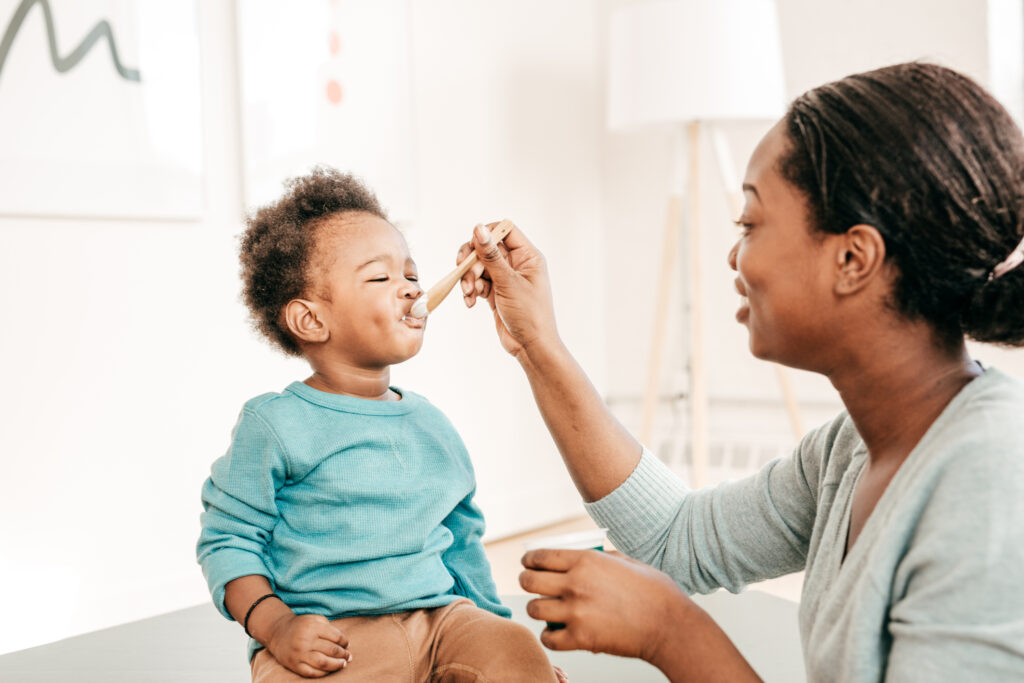Year Two Developmental Milestones


Your toddler’s time between their first and second birthday is a time of noteworthy independence, exploration, and playful learning. This year is marked by significant changes as they expand their vocabulary and express their unique personality. Each day brings new achievements and insights into their growing abilities. TLC Therapy Services is here to support children and their families through this stage and respects each child’s individual timelines.
At 15 Months: Exploration
At 15 months, your toddler’s energy and curiosity are noticeably increasing. You’ll see them testing out new levels of exploration and play.
- Language: They point to request items, showing a growing understanding of communication. They recognize familiar objects when named and follow simple gestured directions. Vocabulary expands beyond “mama” or “dada,” with additional words others can recognize like “bye.”
- Cognitive: They stack and knock over small objects like blocks using hand-eye coordination. They imitate daily activities, such as pretending to read a book or cook in a play kitchen.
- Social: They choose and share favorite toys and can clap when excited. They use hugs to show affection to people and dolls or stuffed toys. They try to imitate things they see other children doing.
- Movement: They will try, and may succeed in taking a few independent steps or even begin walking.
At 18 Months: Little Explorers
By 18 months, your toddler is ready to explore more of the world around them. Seeing new places and engaging with new activities and people builds confidence.
- Language: They follow simple one-step directions and use three or more words beyond parental names.
- Cognitive: They engage in simple imaginative play, such as making the siren sound on a toy firetruck, and imitate household tasks.
- Social: They explore independently but seek reassurance as they go, can sit for short stories, and want to start dressing themselves with less assistance.
- Movement: They walk independently, climb onto furniture, show interest in drawing with scribbles and sit up easily upright in a booster seat.
- Feeding: They self-feed using fingers or utensils (with varying levels of success) and can manage chewing the food in their mouth, and drink from a sippy cup or straw.
Second Birthday Milestones: Onward and Upward
Reaching their second birthday, your toddler is always looking ahead to what’s next, practicing and refining their skills.
- Language: They use two or three-word sentences, identify 1-2 body parts when asked, and may nod or shake their head to answer questions. They can point to objects or pictures when asked things like “where’s the car?”
- Cognitive: They can manipulate age-appropriate knobs and buttons on toys and hold toys in one hand while using the other to play. They are able to engage in pretend games with multiple toys.
- Social: They observe and react to your reactions to new situations, show empathy, and respond to others’ emotions.
- Movement: They can kick or hit a ball, run short distances and walk up stairs without crawling.
- Feeding: They eat with spoons at a normal pace (no overstuffing in their mouth), handle food with less spills, and drink from open cups with minimal spills.
Your baby is actively exploring, engaging in new ways, and revealing more of their developing personality.
Activities to Support Your Child’s Development at Home
Daily interactions through play and conversation are essential for your child’s development.
1
Talk with your toddler throughout the day, describe what you see and do, and read picture books together. Singing songs and naming familiar objects further support vocabulary expansion.
2
Engage in problem-solving activities, like stacking blocks, sorting colors, and playing hide-and-seek, which foster thinking and coordination.
3
Social and emotional growth benefits from playdates and opportunities to model your positive behaviors such as using “please” and “thank you.” Interactive games, like taking turns with toys, help develop cooperation.
4
Make time for physical activity daily, like climbing, running, hopscotch, ball play and dancing, which enhances gross motor skills. Encourage fine motor skills through activities like using clay and child-safe scissors.
5
Encourage self-feeding by offering a variety of finger foods and different textures, helping your child develop confidence in eating and explore new tastes.
If your child is not meeting these milestones, early support can be beneficial. Delays in movement, speech, or social interaction may indicate a need for guidance. If your child is not attempting to communicate, struggling with balance, avoiding eye contact, or having difficulty engaging with their surroundings, consider reaching out for professional advice. TLC Therapy Services can help assess whether an evaluation is needed and guide you through the next steps to ensure your child receives the support they need. Early intervention can make a meaningful difference in their development.
Not sure if your child is meeting expected milestones?
Have questions? TLC Therapy Services is here to help! Call us for an appointment at (770) 696-6649, or fill out the contact form below—we’re happy to guide you toward the right support.
